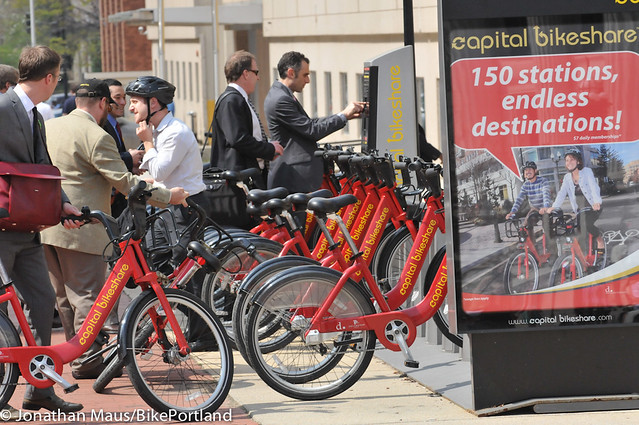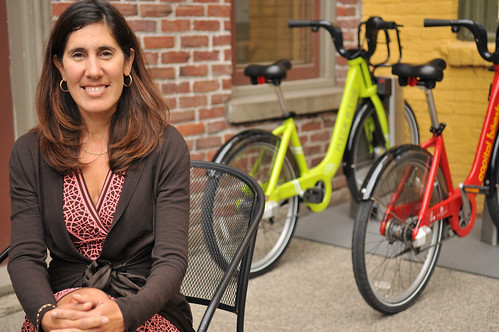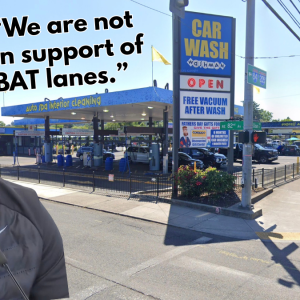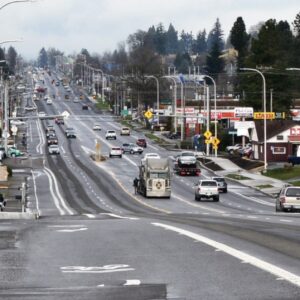
(Photos by J. Maus/BikePortland)
You might have heard by now: A local bike business that bootstrapped its way to the national stage, and then suffered a dizzying series of problems, has sold.
Alta Bicycle Share, a startup that unexpectedly became much larger than the bike planning company that birthed it after launching popular and successful systems in Boston and Washington DC, announced Tuesday that it has been purchased by New York City real estate developer REQX Ventures.
Terms of the deal haven’t been disclosed. In July, the Wall Street Journal pegged the deal at $40 million, but it’s not clear whether any of that money went to Alta’s founders or will be invested directly into the company. It’s also not clear whether Alta’s six cofounders (including local executive and former Portland bicycle coordinator Mia Birk) retain any ownership in the firm.
In July, Capital New York (the first to report on this deal) reported that 51 percent of the company was in talks to be sold. This came after news that NYC’s Citi Bike system had been operating in the red despite its popularity.
Whatever the case, the cofounders of Alta Bicycle Share still own and operate their separate company, Alta Planning + Design. That company has 150 employees worldwide and remains headquartered in Portland.
Tuesday’s announcement will have no immediate effect on Portland’s theoretical deal with Alta to launch a similar 750-bike system in Portland. As we reported this spring, Portland had reached verbal agreements with a private sponsor and was days away from a launch announcement before backing off amid concerns that Alta wouldn’t come up with working equipment for a local system.

here outside her southeast Portland office in
September 2013, one day after the company signed
a $60 million contract with New York City.
Those hardware and software problems, in turn, emerged from the privately owned Alta’s lack of working capital and from the fact that Alta’s exclusive supplier, Montreal-based PBSC, wasn’t able to operate profitably.
It’s possible that the entrance of REQX into the bike share business will inject money into a company that has been treading water for the last year despite rising demand for its service among U.S. cities and their residents. It’s also possible that REQX, a major New York developer, will invest only enough to hold on to Alta’s existing contracts without making efforts to further evolve the business.
On that front, the most hopeful news Tuesday might be the selection of Jay Walder to take over leadership of Alta Bicycle Share. Walder was a successful executive at Transport for London before coming to New York City to run that city’s transit agency, the country’s largest.
As CEO of the MTA, Walder earned $350,000 a year. In 2011, he moved to a job running Hong Kong’s private transit system, where he earned the equivalent of $950,000. So it’s likely that Walder’s hire is a major investment by REQX and a vote of confidence in his ability to grow the bike sharing business.
“It sounds like they’re going to be making more investment into the company, which is great,” said Paul DeMaio of MetroBike, a bikesharing consultant and contractor for Arlington County, Virginia, which co-owns Alta affiliate Capital Bikeshare, in an interview. “They’re getting quality candidates to take some of the corporate roles. … I just hope that they continue to evolve and make improvements.”
Advertisement
Here are some interesting tidbits from the recent flurry of media coverage.
From the New York Daily News:
Alta, the troubled operator of Citi Bike, sold its stake in the bike share company to REQX Ventures, a real estate company. Prices for an annual membership are expected to jump from $95 a year to $145.
Alta had struggled to make a profit with Citi Bike, the largest bike share program in the country. City officials had refused to greenlight hikes in the program unless new management was brought in.
The company is also benefiting from a whopping $70.5 million cash infusion from its prime corporate sponsor Citi Bank. That added capital brings the financial company’s investment in the program – which costs tax payers nothing – up to $111.5 million.
The Portland Mercury, which last Friday was the first local outlet to share news that a deal was nigh:
Internal Portland Bureau of Transportation documents obtained by the Mercury show Mia Birk, Portland’s former bike coordinator and vice president of Alta Bicycle Share, presented details about the acquisition by REQX in early August. Birk’s presentation apparently touted millions in “upfront new investment” to the company once REQX held the reins, but it appears that’s largely focused on New York’s CitiBike system. Birk’s presentation also mentioned the “building of a sales and marketing team to drive additional corporate sponsorships,” which could be great, if it means someone can find Portland sponsors.
Portland Business Journal, writing today:
Mia Birk said Tuesday that selling the bicycle share business will allow the company [Alta Planning + Design] to refocus on its original mission — facilitating bicycling by creating paths and corridors.
The 150-person company operates from 27 offices, with Portland as its headquarters. Its current projects include bike paths, projects to create protected bike lanes on city streets and sustainable transportation campaigns.
Birk said she loved working on bicycle sharing projects but it’s time to turn the reigns over to a well-funded organization with the connections needed to make the systems work. The 10 bicycle share systems now operating in the U.S. depend on sponsors to foot much of the cost.
The Oregonian, today:
[Portand Bureau of Transportation Spokesman Dylan] Rivera declined to comment about when – or if – the city hopes to launch a bike-share program that is supposed to be funded with a $2 million federal grant and $2 million from local sponsors.
“We’re still involved in an ongoing process to monitor other bike-share programs to see what makes them more successful and less successful,” he said. “We’re continuing to do our due diligence.”
Three years ago, as Alta celebrated the news of their big contract with New York City, Birk called it a “game-changer.” It turns out that was true — although probably not completely in the way she envisioned.
Here at BikePortland, we’re hoping that the willingness of two major New York companies is (like the entry of new companies into the bike share marketplace) a sign that the bike share business model in the United States is on its way out of an endearing but awkward adolescence.
Correction 10/29: An earlier version of this post incorrectly described Paul DeMaio’s relationship to Alta Bicycle Share.







Thanks for reading.
BikePortland has served this community with independent community journalism since 2005. We rely on subscriptions from readers like you to survive. Your financial support is vital in keeping this valuable resource alive and well.
Please subscribe today to strengthen and expand our work.
In our city of rains, the Mercury gets the right reins. Portland Business Journal, not so much. Guess the Mercury reigns!
Homonyms our difficult.
It is great that Citibikes will be expanded. That is a terrific bike share system. It is so heavily used that it has problems with rebalancing, but that seems a good problem to have. It is also great to see that the annual fee will be raised. $99/yr in New York City was too low. I use the Citibikes whenever I’m in NYC on business and it has saves me hundreds in cab fare each year.
Is there anything in the Portland/Alta contract that establishes performance deadlines? (If not, whoever negotiated for the City needs to lose their job.) I’d really like to see this thing go up for re-bids.
There’s no deadline. On the other hand, the city can pull out of the contract at this point of its own volition, with 30 days’ notice. Here’s the contract if you’re interested:
https://www.dropbox.com/s/c69d1k333e69vle/Portland%20Bike_share_contract-final_Jan_8_13-clean.doc
And here’s the piece we did last year, looking at the details of the Portland plan. Still a useful resource, though the financial projections are increasingly outdated:
http://bikeportland.org/2013/09/04/10-key-details-from-portlands-bike-share-proposal-and-contract-93341
I am becoming ever more pessimistic and don’t expect to see the bike sharing implemented in Portland. I predict the new owner will seek to renegotiate the contract with Portland. That will lead to a need for additional local (city) money. That won’t go over well. The grant money will eventually disappear, too.
I regret that Portland will lose another corporate headquaters, particularly a sustainable transportation firm, but I’m glad this bike share program will continue.
Alta operating Portland bike share is a punch line at this point, vaporware on the same level as Duke Nukem. (And remember what happened when that game actually came out.) Probably time to kill it and repurpose those grants to projects that we can actually build.
Portland was idiotic for giving the contract to Alta at a time when they had a series of clear and serious failures on their hand. You don’t board a sinking ship, but Portland ran on with the whole family. NYC should have seen the problems in Boston and reconsidered Alta…. But Portland had access to the failures in Boston, NYC and Chicago, and still went with the local friends. It’s great to have contacts in City Hall!
Incidentally, every article talks about how the systems can expand now thanks to new money….but not one explains HOW. The bikes Alta used all came from PBSC/Bixi and they went out of business with their assets now owned by someone else.
Glad to hear the company taking over seems interested in expanding bike share, and not a front for Motordom to starve it and shut it down. Because they do have a history of doing that, and bike share is definitely a threat in places where it’s gotten going.
I love that there is more funding for bike share, but is anyone else put off by the interests of the investment portfolio?
The purchasers are composed of “high performance lifestyle leader” and a “prominent real estate firm.”
Is this who we want running our bike share system? if Portland has any hope for an equitable bike share deployment, or to create something that serves more than the wealthy inner neighborhoods, they’ll want to think about how this impacts those goals.
I’ve always been impressed with the NiceRide non-profit model of bike share.
Yes, I was disappointed by this when it was first rumored a couple months ago. The large price increase for citi-bike is also a blow.
Bike share is a transit system first. A public-private model can potentially work, but it still needs to be run as a public transportation system with a tremendous amount of public oversight, not as a profit centric system or it is going to be reserved only for wealthy neighborhoods and wealthy people.
I think the ideal would be some increased standardization of systems so the bikes, stations, and software are more interchangeable and different suppliers can compete easily at that level rather than at an operations level. Then a city could more easily choose to run their system independently, or use a contractor like Alta to run it depending on how they want to fund it. Hopefully this infusion of money will actually help lead to that.
Why does bike share need to be a “transit system first”? What’s wrong with a profit-centric system that would allow for potentially improved equipment and maintenance standards with faster system expansion opportunities? Why not consider that a privately operated model that provides an alternative transportation option to the public, such as Zipcar or Car2Go? This wouldn’t change the ability for public agencies to partner with the private company in order provide subsidized memberships to allow equity access (plenty of giant private companies have corporate responsibility programs that offer grants and the like to give back to their community – it’s not an unprecedented idea).
If you want a local example of why considering a private model may be advantageous, check out the long-term financial outlook for TriMet.
I’m definitely not saying a private model will be perfect or the best way to go for every city, but there’s no reason to immediately demonize the private model without including facts as to why it’s a bad system.
Congrats to Mia for launching such successful bikeshare businesses in the US…NYC, Chicago, Wash DC. Like any start-up, once the business model is established and successful, large investors make their move, and the creatives can move on to new things. Alta Planning & Design is still HQed in PDX.
Michael, any attempts to get clarity from the folks at Alta regarding the questions/uncertainties that you raised in the article?
I sent an email to their spokeswoman in July, asking these questions and saying that we’d want to write about them when/if the deal was made public. Never heard back.
Various outlets reported yesterday that the terms of the deal weren’t being disclosed.
Side note: I know tourists are essentially subsidizing the annual memberships but $145 still seems like a very risky rate hike for NYC. At that price point, a New Yorker has a pretty wide shopping selection of low end rides to choose from that can be parked anywhere at anytime.
That they also have to maintain and still carry a lock for or store.
I still think Bikeshare (esp. in NYC) is competing against transit, cabs, and walking. I don’t think it’s really competing against people buying their own bikes.
I can only talk of my personal experience of all those modes in NYC, but I’d come to just the opposite conclusion–that New York would especially bump up against people choosing a beater bike over bike share at a certain price point. Maintenace is a more Portland concern in my experience. There’s an ocean of bikes in Brooklyn that can’t be worth over $150 that people lock wherever they feel like. Month to month it’s beans but sales and travel choices are largely psychological, anyway.
I know it’s the recieved wisdom that bike share doesn’t compete with the formal bike industry. And I think that still holds true. But the informal industry (particularly, low end private sales) holds a few practical advantages over bike share the more expensive an annual pass gets.
Looks like the new management is off to a wonderful start. After announcing that they would communicate with customers in advance of the price hike…they secretly flipped the switch last night. Their Facebook is full of angry members saying they wont renew.
Incidentally, a year of Velib in Paris is 29 euros.
Not much difference between $99 and $149, spread over a year it is like $4/month.
The point of bike share NYC style is that you don’t have to cart your bike around, lock it, or maintain it. You walk a couple blocks, take a bike, ride, leave the bike, and go on about your day. If it starts raining later, you can take a cab or the subway, you don’t have to ride in the rain. If you have a multi-mode commute, you don’t have to squeeze your bike on a subway car or commuter train. The bikes are clean and working, almost always. And they are not low-end rides – they have internal gear hubs, integrated lights, full fenders, drum brakes – basically a fully equipped “city bike” that would cost some meaningful money to buy.
The core Citibikes member uses the bikes daily, sometimes a couple times each day, making the service, even at $149/yr, super economical compared to a subway ride at $2.50 and a taxi at $10-25 in Manhattan.
My guess about the problem in Portland is that we are a small city, not a major media market, so the value of sponsoring a bike share isn’t that great. Just a guess.
I still can’t help but think of station based bike share systems as being yesterday’s technology, tomorrow ( or maybe next year). The efforts out at the Intel campus seem like a step in the right, cheaper direction.
Out of sight, out of mind. The stations act as giant advertising billboards.
The company has been working with 8D to develop the next generation of station/docks (there have been media stories about this in recent months) and is working with other bike manufacturers to develop bikes that will look different from PBSC bikes but work with the existing and future docking technology.
In addition to Citibike already being union, employees at some of the bikeshares (DC, boston, Chicago, and hopefully more) are unionizing in response to inconsistent management/communication on the local and corporate level. There is also concern that a large company like REQX will shrink wages and benefits for the hourly employees that make the system function day to day.